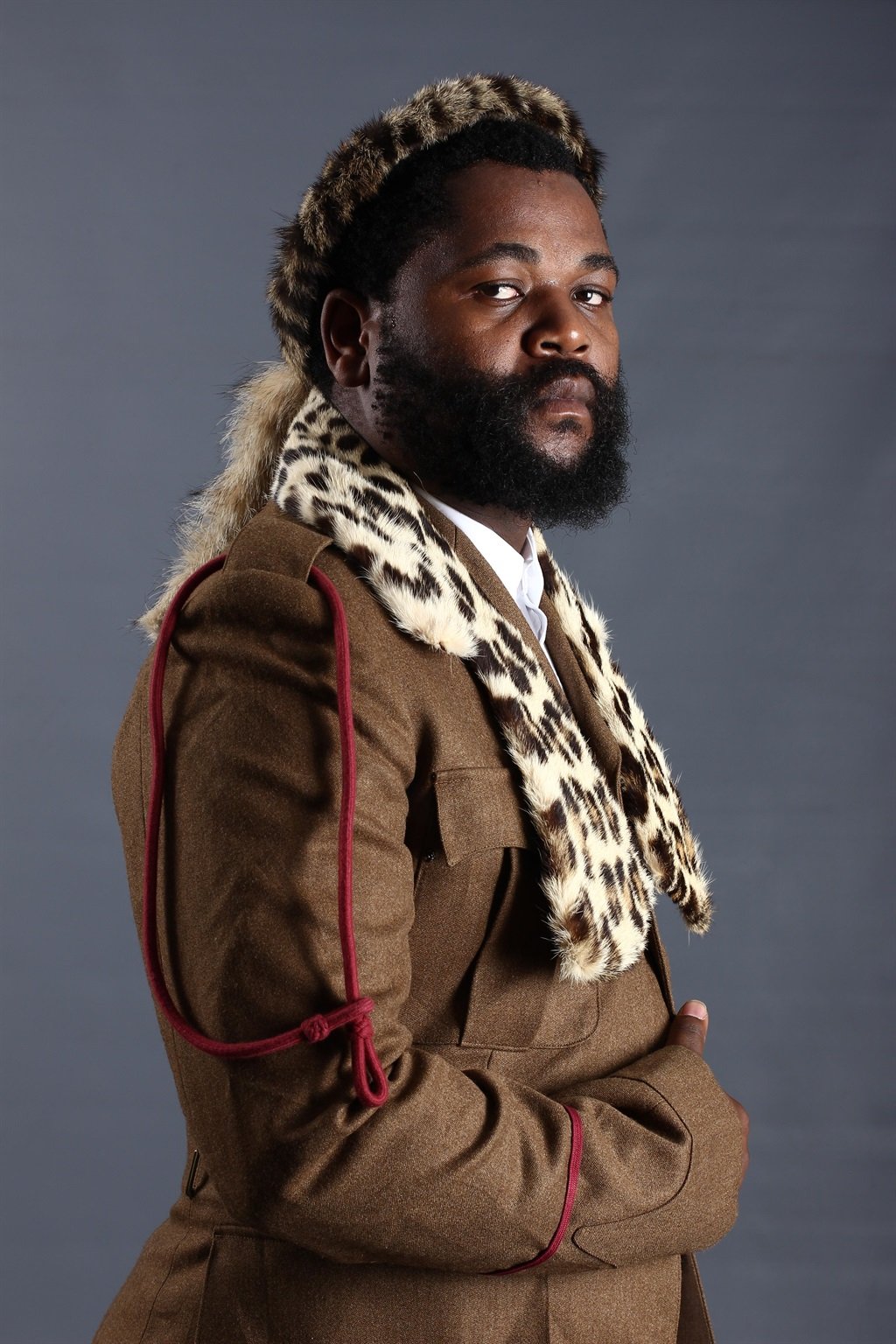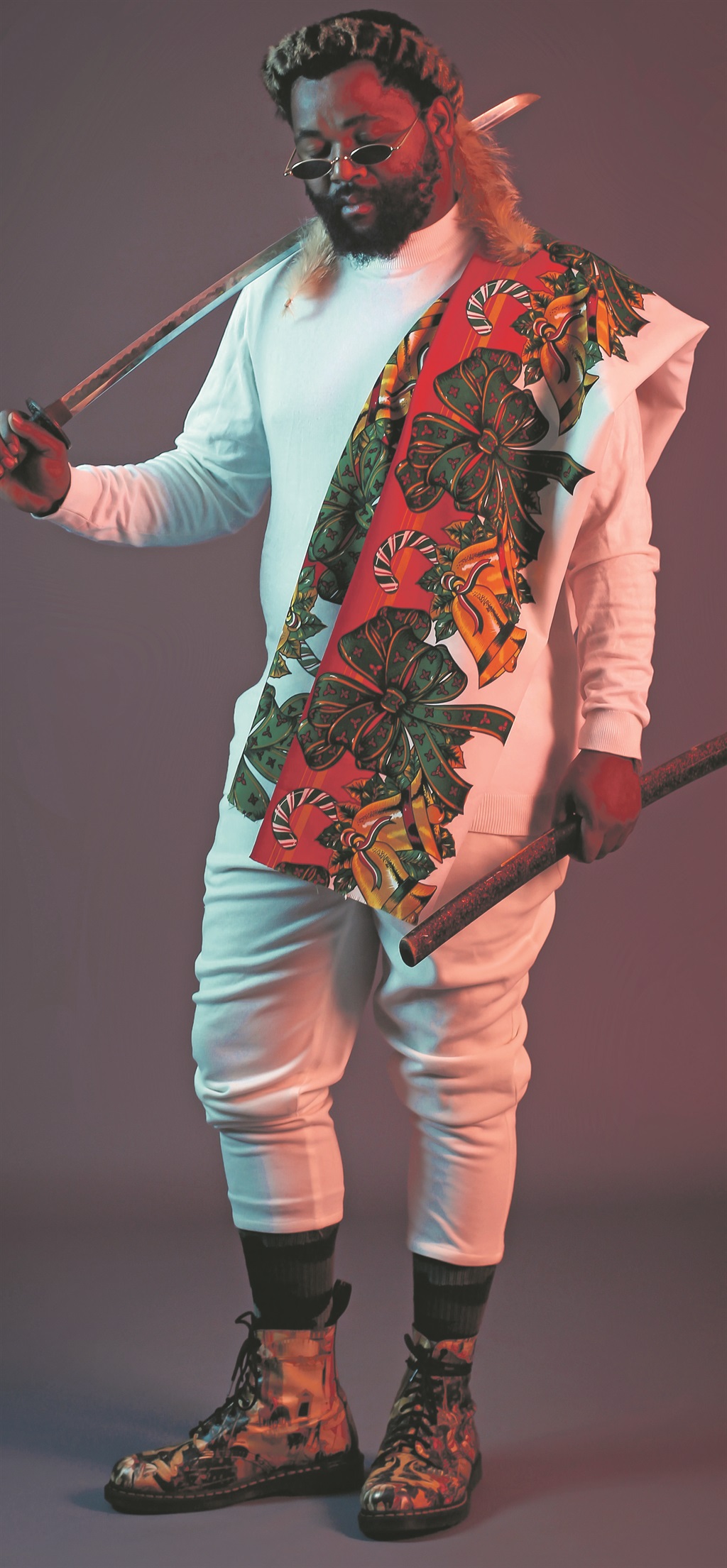
Despite winning the Viewers’ Choice Best International Act category at the BET Awards last year, Zulu rapper Sjava prefers to keep out of the spotlight. Sihle Mthembu unpacks his much-anticipated sophomore album Umqhele, a body of work featuring close personal examination, deft humour and unexpected honesty.
Sjava doesn’t like the fact that his fans want him to have a broken heart. The award-winning recording artist tells me this on the other side of a crackling phone line and I can hear that he hasn’t slept well. It’s been a busy three months and the hustle and bustle at the tail end of last year was compounded by the fact that, in the tornado of it all, Sjava released his much-anticipated sophomore album, Umqhele. No skits, just 18 songs that run for almost an hour and half, which were created under the infamous record label Ambitiouz Entertainment.
Umqhele is an album that operates on more than just the emotional broad strokes of love, hate, grief and joy.
“I always want to try and give people something more layered and different. I never want to feel like I’m repeating myself as an artist or charting obvious territory,” he says.
Sjava’s best tools are his words. That’s why he’s been able to pen hit songs not just for himself, but for his peers as well. He is not the best singer, but his voice is unique, partly because his tone is coloured by the heaviness of his tongue. He carries the weight of isiZulu as a language both in the words and how they’re delivered. He is familiar with the limits of his range and honest about it. This, coupled with the fact that he is influenced by genres as disparate as maskandi and trap, makes him an elusive chameleon, so I try and pin him down.
“I think there is a lot of interesting experimentation outside of the mainstream, that’s what I try to tap into,” he says.
“It’s always good to draw inspiration from people outside of your own experience.”
Umqhele
The monosyllabic rhyme scheme is a tool that is often used by rappers to elongate or contract words to fit into whatever bars they’re rapping. Kid X is probably the best at it when he’s gliding through beats. On Umqhele, Sjava makes us aware of this rhyme scheme and its potential when used by vocalists. He chops up words with wizard-like ease, but they’re never beyond recognition.
What you might not know about this album is that Sjava has been working on it since he released his debut Isina Muva in 2016. Why did it take him two and half years to follow up such a massive album? Well, he tells me, he’s been going through some things.
“Sometimes you really need to go and enjoy your life and be with friends and family to find new inspiration. But I make music all the time, it was just a matter of being happy with what I had to put it out.”
But he is back and Sjava really wants to work with Thandiswa Mazwai. But then again, who doesn’t? On this album, it’s the collaborations that stand out.
Eweni is a sultry cut that fuses 80s downbeat bubblegum with the peak romantic maskandi of the early 2000s, made popular by artists such as guitarist Mfiliseni Magubane. Mzukulu and Anzo shine on the sparse stringwork and give an anthemic feel to a song that could have been little more than a run-of-the-mill track about a man uncertain about his relationship. This is a lo-fi singalong about navigating the emotional tremors that come with falling in love with someone who doesn’t know who they are yet.
Other songs such as Ikhandlela – another standout track, this time featuring Bongani Radebe and Fatso – are teeming with desperation run amok, meandering in structure and are a not-so-subtle portrait of masculinity at its most downtrodden. Laced with heavy saxophone, Ikhandlela is a sentimental take on being stood up and a song that shouldn’t work, but is five and a half minutes of bliss.
Punching above his weight
This is not microwave music. Umqhele is a full meal with a novelistic approach, and Sjava and his emotional woes are the subject. Although there are details, nothing is fully explained.
This is the big leap forward from Isina Muva. For instance, in the song uJesu, Sjava pines and declares his love for an unnamed woman. He promises to love her until Jesus comes back, then sidebars about how he earns R25 000 and that he will spend R5 000 with this woman and give the other R20 000 to his mother. It’s a delight that leaves you curious not just about what he’s trying to say about the love he has for this woman, but about what he’ll spend the R5 000 on. Will he save some of it to pay for her lobola or will he gamble it away on horses and end up losing everything? Will she still love him then? Is this a comedy or a tragedy?
It’s these little intricacies in the music that distinguish Sjava from just another guy who writes lyrics to a songwriter who constantly punches above his weight. It’s not hard to get lost in these little side roads and wormholes that he leaves open on Umqhele.
Although this project has a soft core, it does not bend to the whims of being simple. Instead, Sjava uses close personal examination, deft humour and unexpected honesty to make his message cut across, and it’s a simple one: “Please listen to me, I don’t know what I’m doing.”
This admission of uncertainty is a shocking turn of events in a time when men are expected to have all the answers, be boastful and in control. Umqhele is an attempt to feel free.
Through this album, Sjava is also reminding us that bitterness can be a useful emotion. He pivots up and down the scales of a thrilling romance to a devastating heartbreak. It’s his sincerity and ability to deliver against those backdrops that lets us allow him to occupy both these worlds. He is one of the few artists whom we’ve allowed to mirror the reality of what it’s like to live as a fully developed human being. Imagine that.
Unengaged observer
Although Sjava treats his music like a calling, at best he is a reluctant respondent. Notoriously reclusive and unwilling to self-promote, he often hides in plain sight in taxi ranks and kota houses among the forgotten masses of this rainbow horror show. This is where he draws inspiration for some of his darkest material – in the reality of everyday life that fame could so easily strip from him.
That’s where songs such as Isibhamu, which is about being held at gunpoint, or Wamuhle, an abbreviated ballad told from the perspective of a man admiring the corpse of his dead lover, come from.
On this record, Sjava embraces the demeanour of a man struggling to find gratitude for his lofty place in a world that is unmitigated chaos and increasingly alien. On Umqhele you can hear him chuckle in the background almost in disbelief on more than one occasion, as if to say “nah, this ain’t it fam”. It’s this vantage point as the unengaged observer that makes him a compelling artist.
Generally, Sjava is forcing us to ask an essential question, who’s to say you’re not the evil one? With Umqhele he makes a simple yet compelling case – that just because black men struggle to communicate doesn’t mean we should stop listening.




 Publications
Publications
 Partners
Partners









